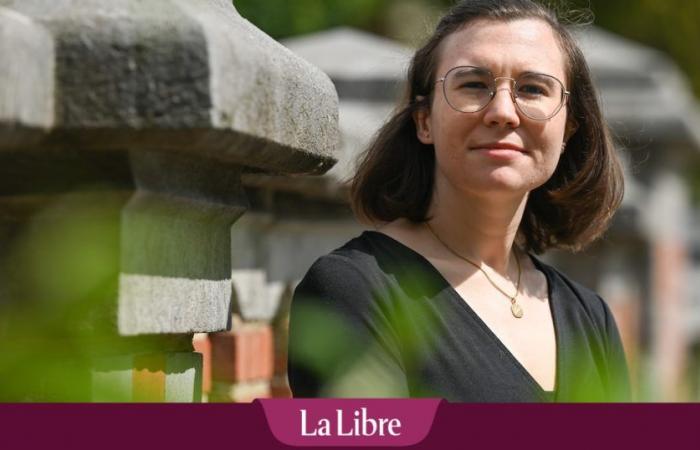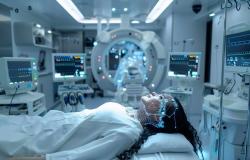Her gaze sometimes shifting, Marie narrates her story with an impressive flow of speech. Fast as her gestures – sometimes clumsy – and her determined gait, her bust slightly leaning forward. Like a tornado, the 32-year-old woman opens up, without any apparent taboo. Clearly determined to want to free speech.I am terribly shyshe had warned us before the meeting, but, after talking about it with my psychologist, now, I really want to talk, to testify, to share my experience; It’s important to me“. That said, “I hate looking people in the eye when I talk to them; it makes me feel deeply uncomfortable.she admits to us with a smile in the corner of her eye, before clarifying. This is also one of the characteristics of people with ASD, which leads to the development of the proven technique of fixing a point in the distance just above the shoulder.“. Here we are.
Because if, at first glance – unless you look at particular signs – nothing suggests it, the young Brussels resident nevertheless does indeed suffer from autism spectrum disorder (ASD). She also had to wait until she was 31, that is to say last year, for the diagnosis to be made, after having been treated for six years for bipolar disorder.
A long diagnostic wandering
If today Marie has this desire to recount her journey in detail, it is in particular to evoke this diagnostic wandering – or even this error – which is still too widespread, according to her, in terms of psychiatric disorders. “ASD is listed in the DSM, she states straight away, referring to the Diagnostic and Statistical Manual of Mental Disorders, but it is also a neurodevelopmental disorder. In my opinion, it’s more of a handicap, even if there are a lot of psychiatric comorbidities.” In the process, she lists : “Anxiety, depression, obsessive compulsive disorder, ADHD (attention deficit hyperactivity disorder)… Besides, I have the diagnosis of ASD, but also ADHD and HP (high potential)”, she says in passing, laughing. Like when she introduces herself: “I’m 32…and all my teeth“. Lucky teeth… “Yes, as if that wasn’t enough, it needed this on top of that.“.
“With this syndrome, I can suddenly hit the stomach or buttocks of people I don’t know. In the street, it’s rather stressful”
While she hastens to explain that today, she is staying for the week in a psychiatric care home (MSP) in Uccle – a transition structure (typically between hospitalization and a return to independent life) – we forces him to take a “little” flashback to his childhood. At five and a half years old, the little girl who already knows how to read, write and calculate spends two weeks in primary school only to find herself immediately parachuted into second year. “I was curious and demanding”, she says to explain her early learning. For the rest, his memories of the first years of school were “a lot of mockery because, at the time, my ears, which were operated on a year and a half ago, were really very protruding. So, the jokes, already in kindergarten, were on fire! I was always a bit of a black sheep and a bully, especially since I was very short. My classic nickname was Dumbo! I was harassed, mocked. I felt I was different. In primary school, from memory, it was a little less bad. In secondary school, passable. The academic results followed, without too much effort.“. And in fact, having left her humanities at 16 and a half, the teenager offered herself a second rheto in Boston. “It was at this moment that I had my revelation for maths even though, until then, I was really bad at it. I realized that this was the way of teaching that didn’t suit me. In every way, this year has been great.“.
A battle against mental health concerns
Back in Belgium, “It was necessary to choose studies” she concedes. “Before leaving for the United States, I wanted to study psychology. I was always interested in understanding how the brain, human beings, and social relationships work… But I was told that there weren’t many opportunities. To stay in the healthcare field, I started a first year as a nurse. Academically, it was going very well, but in terms of care, ouch ouch ouch… I wasn’t gifted at all because I couldn’t remember the procedures.“. In May, she gave up, after having hesitated even in the queue for registration between psychology and Germanics to be a language teacher. The student finally opted for psychology. “In masters, I chose the research option because I did not feel ready to face patients“. She will write a doctoral thesis and work for five years in research at the ULB. At the same time, the student will complete her training with a second master’s degree in neuropsychology, while she had started training as a psychotherapist.
But now, reaching the goal, three months before submitting her doctoral thesis, Marie has to stop everything due to health problems. “Since I was little, I struggled with mental health concerns, which have never really been characterized”, she explains. But still? “Let’s say it was more of an anxiety-depressive disorder. until, in 2016, I was diagnosed with bipolar disorder type 2. It was a relief because, finally, someone put a word to my discomfort. But with that comes some pretty heavy treatments: antidepressants, neuroleptics, mood stabilizers, antiepileptics, sleeping pills… The whole lot. Which also caused a lot of damage at the somatic level since it – among other things – completely disrupted my endocrine system. So, I gained 40 kg to reach more than 100 kg for 1m60. 3 years ago I had gastric bypass“.
“I scratch myself until I bleed. It fascinates me and I get satisfaction from it. It’s unhealthy.”
A first hospitalization in psychiatry
But if the intervention went well, you should know that “the bypass affects the absorption of medications. It’s like I’m going through withdrawal. Horrible“. Consequence: a first hospitalization in psychiatry in 2021, during which a young psychiatry assistant “twitches” at the diagnosis of bipolarity, which will be “officially” called into question after several months of treatment. Seeing that the medication was no longer reaching the therapeutic dose in the blood, they both decided to gradually wean themselves off these treatments for bipolar disorder and noted that “Without the medication, things were no worse. There was no decompensation“On the other hand, other symptoms that have remained hidden reappear, such as cognitive disorders, attention problems, hyperactivity, etc.
Once ADHD is under control following the taking of a psychostimulant, “we said to ourselves: it’s not just that“The question then arose about the possibility of an autism spectrum disorder.”I filled in all the boxesMarie continues. Big problems with social communication, creating and maintaining connections, everyday difficulties, clumsiness, need for routines, structure, a looooong amount of time alone… I have a lot of difficulty leaving the house. To go shopping, I aim for off-peak hours and small stores. A hypermarket is hell for me. Too much choice, too much noise, too much light, too many people… It’s not so much that I don’t like meeting people, but that social interactions are difficult for me because my social battery runs out very quickly. So I get tired very quickly. And the only way to get back on my feet is to lock myself in my house for two days and not see anyone anymore.”
I don’t have a picture in my head
One year after putting forward the hypothesis, the diagnosis of ASD with Asperger’s profile was therefore confirmed by a specialized psychologist. In September 2023, when Marie is 31 years old. “I learn fastrecognizes Marie, but I don’t have a very good memory, except for totally useless things like license plates, dates, phone numbers… On the other hand, if I pass you tomorrow in the street, it’s as if I had never seen you. There are no images in my head. If someone says ‘imagine’, I can connect concepts, but no image forms. On the other hand, words are very important to me because I read and write a lot.”
“That day, I went home and cried for hours. Suddenly, my whole past came to light. This diagnosis changed my life”
Another characteristic is that “until recently, I couldn’t identify emotions, even if I knew the concepts, the words…. I could tell if it was okay or if it wasn’t okay, but no more. months that I have been working with my psychologist on the identification of emotions. Now, I am able to identify the primary emotions. I can finally say if I am sad, angry, happy…”. So when we play at asking her how she feels right now, she thinks for a few seconds before answering.: “A little stressed, still, but it’s manageable. I also feel happy to be able to share my experience because I discovered that I was not a unicorn. In the sense of ‘some kind of unique thing’. I realized that there were many other women who had been discovered to have a mental disorder, like bipolarity in me, before it was realized that it was actually ASD.”
The future step by step
At the beginning of July, Marie is expected to leave the psychiatric care home where she has been staying during the week for several months. Gradually, she will have to learn to live alone again, while benefiting from various psycho-social assistance and psychiatric monitoring. Is she dreading this return to normal life? “Yes of course. I must say that I have only discovered in the last few months what it means not to have daily suicidal thoughts, as I always had, even as a child.. Now I finally have the words to put to what I felt since I was little..”
No resumption of professional activity planned in the immediate future, or even in the medium term.For the moment, I’m volunteering in a small cooperative store which suits me well because it’s very routine even if it remains very tiring for me. But my priority is really recovery.. Finding a peaceful daily life even if, today, in itself, morale has never been so good for years. As well as the ability to manage and cope. I am also working on preparing an intervention plan to recognize the warning signs, whether at the level of my thoughts (ruminations, anxiety, suicidal thoughts, etc.) but also at the somatic level (fatigue, stress, etc.) to prevent a possible relapse that I dread. My state of mind is to go there, not day by day, but step by step. I allow myself to think that I have the right to have a pleasant daily life.”
Through “Words for Evils”, Free has chosen to give voice to people affected by various illnesses, both physical and mental, common or rare. Meetings whose objectives are to understand their daily lives, their difficulties and hopes, to share their outlook on existence. A way also to remind that no one is safe from these accidents of life. This series can be found every other Monday on our site.






